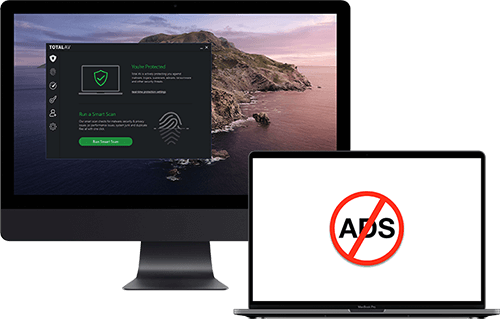Top 5 Best Ad Blockers 2023
Compare the Best Antivirus Software for all your Devices
- Get Rid of Annoying Ads and Pop-ups
- Remove Adware Viruses generating Pop-ups
- Best Ad-blockers across all Browsers and Devices
- Improve your online privacy and safety

2024 Editor’s Pick
1

- #1 Antivirus Provider 2023
- Removes Viruses, Adware, & Malware
- Includes Firewall Protection
- Advanced Ransomware Protection
Available on:

outstanding
2

- Includes Smartphone Antivirus
- Advanced Firewall included in all plans
- Compatible with all operating systems
- Perfect for home users
excellent
3

- Compatible with all devices
- Advanced Firewall included
- Removes Viruses, Adware, & Malware
- Spam & phishing e-mail blocker
Great
4

- One solution to protect your devices
- World-class virus and malware protection
- Includes Smart Firewall and Password Manager
- Darkweb Monitoring powered by LifeLock
5

- One of the most trusted around
- Compatible with all devices
- Perfect for home users
- Advanced Firewall included
#1 2023 Editor’s Pick

FREE
- #1 Antivirus Provider 2023
- Removes Viruses, Adware, & Malware
- Includes Firewall Protection
- Advanced Ransomware Protection
Available on:

2

$29.00
- Includes Smartphone Antivirus
- Advanced Firewall included in all plans
- Compatible with all operating systems
- Perfect for home users
3

$19.00
- Compatible with all devices
- Advanced Firewall included
- Removes Viruses, Adware, & Malware
- Spam & phishing e-mail blocker
4

$34.99
- One solution to protect your devices
- World-class virus and malware protection
- Includes Smart Firewall and Password Manager
- Darkweb Monitoring powered by LifeLock
5

$44.99
- One of the most trusted around
- Compatible with all devices
- Perfect for home users
- Advanced Firewall included
What is an Antivirus Software?
An antivirus is a software program designed to detect and remove malware from a computer or mobile device. Traditional antiviruses scan your files against a built-in malware database, flagging unsafe files that match the database. More advanced antivirus programs use machine learning, heuristic analysis, and cloud-based malware directories to detect and remove zero-day threats and very sophisticated malware. All of the best antiviruses offer real-time protection, so they scan every file before it executes to ensure malware never even starts running on your device.
Why do you need an Antivirus?
In recent years, people have become increasingly reliant on electronic devices. It is crucial now, more than ever, to have adequate security to protect your personal information from viruses and hackers. That’s where antivirus software comes in. Antivirus software, also known as anti-malware, is a computer program used to prevent, detect, and remove malicious software from your computers, tablets, and mobile devices.
There are many different types of malware, viruses being the most well-known. Here we have highlighted some of the lesser-known types of malware that all security-conscious users should be familiar with. To learn more, follow our blog for the latest updates and information.
Disclaimer
AntivirusAdviser’s reviews are the honest opinions of our team of expert cybersecurity professionals. Our reviews are neither paid for nor sponsored by antivirus providers, although we may earn an affiliate commission through some of our referral links.
At AntivirusAdviser, our goal is to provide transparent, informative, and easy-to-understand reviews of antivirus solutions for all devices and operating systems. We hope these reviews will give you the insights needed to make an informed decision about your antivirus purchase.
How The Best Ad Blocker Can Improve Your Browsing Experience
Want to turn on a Christmas song on YouTube? You’ll first have to watch an ad from an online department store for half a minute. Almost all websites that offer free videos, news, recipes or music can survive thanks to advertising. With the help of the best ad blocker, more and more internet users are able to bypass these ads. Should you use an ad blocker too?
Relaxed browsing
Ad blockers are available for almost any device that can access the world wide web. Most ad blockers are add-ons (extensions) for internet browsers. After installation you hardly see any advertising. Not only that department store advertising on YouTube is blocked, but also banners and Facebook ads. It’s wonderful to browse the web ad-free.
Your favorite websites are missing out on income
Website owners are not happy with the rise of ad blockers, as ads are their only source of income. That’s understandable. Worldwide, websites miss out on billions of dollars in revenue every year as nearly one in five internet users is using an ad blocker, and that percentage is ever increasing. When you install an ad blocker, your favorite websites might miss out on income.
Why choose an ad blocker?
But why should you install an ad blocker in the first place? Well, installing an ad blocker not only bypasses online advertising, it also protects your privacy. Ad blockers prevent your computer from communicating with advertisers.
Yes, ad blockers might cause your favorite website to lose profits. However, there are alternatives to online advertising. More and more websites and online services are choosing a different revenue model.
For example, in recent years newspapers are using a paid model for their online articles and paid services like Spotify, Blendle and Netflix are very successful. Other websites request donations from their loyal followers or sell merchandise.
The best ad blocker gives you the option to only block annoying and disruptive ads and to stop blocking ads entirely on certain websites. That way, you can still support your favorite blogger or news site.
If you choose this option, keep in mind that websites that you trust often do not control which advertisers receive your click data. Your computer then communicates with advertisers’ servers.
Improving your browsing experience
The right extension can help you to block online ads and avoid getting attacked by malware. But these apps don’t block all ads – many businesses pay ad blocker developers a lot of money to whitelist their ads. That’s why it’s extra important to choose the best ad blocker you can rely on!
Advertising servers not only serve advertisements to your browser, they actually create a personal profile of you – based on your browsing habits, your search history, your preferences, and your personal data that you enter on specific websites. Third parties are then allowed to purchase this data and use it to their advantage by targeting you specifically.
When ad blockers stop all content that makes up the online ad, your browser is then able to purely download the actual content. Nothing more nothing less – all without distractions. This speeds up website loading times considerably.
The main advantage of using an ad blocker is that it blocks ads. How unexpected! Websites look cleaner, you are no longer bombarded with annoying pop-up ads or sudden and unwanted sound effects… Needless to say, it can make the time you spend online incredibly pleasant – almost as if you got a virtual visit from Marie Kondo!
So in short, here are the pros and cons of using ad blockers.
Pros of using an ad-blocker
- Ad blockers improve your privacy online. An ad blocker also blocks many tracking cookies and other techniques that marketing companies use to ‘follow’ you online. They display targeted ads based on your surfing behavior, or create a more extensive profile of you.
- Ad blockers make surfing faster because you don’t have to download ads.
- With an ad blocker you are less likely to get malware through fraudulent ads.
- On some websites, ‘aggressive’ banners fill up the entire screen. An ad blocker makes such websites easy to use again.
Cons of using an ad blocker
- Because of ad blockers, websites have less advertising income.
- Sometimes you are simply unable to visit a web page when your ad blocker is running, ‘turn off your ad blocker or you will not be able to access our content’. That’s rather annoying.
- An ad blocker sometimes ensures that a web page or certain content (texts, pictures, videos) is not displayed correctly in the browser. To be able to use such a website properly, you can add it to the ad blocker’s whitelist.
Whitelisting websites you’d like to support
Do you want certain websites to be able to show ads? The best ad blockers allow you to whitelist specific websites. An exception is then made for the site. In some cases, this can help when the site isn’t working properly. You can also use this option to support the website.
The steps for whitelisting differ per ad blocker. If you use an ad blocker that does not have this function, you can (temporarily) disable the ad blocker entirely.
If you are looking for a trustworthy and reliable ad blocker that allows for a great browsing experience, have a look at our recommended options at the top of this page – or check out their reviews here!
Looking for a pop-up blocker instead? Make sure to check out our best pop-up blockers here!
